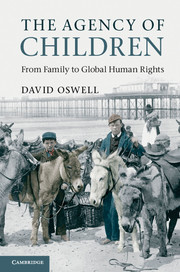Book contents
- Frontmatter
- Contents
- Figures
- Acknowledgements
- Part I Introduction
- Part II Social theories of children and childhood
- Part III
- 6 Family and household
- 7 School and education
- 8 Crime and criminality
- 9 Health and medicine
- 10 Play and consumer culture
- 11 Political economies of labour
- 12 Rights and political participation
- Part IV Conclusions
- Bibliography
- Index
7 - School and education
Published online by Cambridge University Press: 05 April 2013
- Frontmatter
- Contents
- Figures
- Acknowledgements
- Part I Introduction
- Part II Social theories of children and childhood
- Part III
- 6 Family and household
- 7 School and education
- 8 Crime and criminality
- 9 Health and medicine
- 10 Play and consumer culture
- 11 Political economies of labour
- 12 Rights and political participation
- Part IV Conclusions
- Bibliography
- Index
Summary
In this chapter we will consider the school, not so much as a site of learning and teaching but as a particular kind of social setting. As a particular kind of institution, it has brought children together and aligned them with regard to their measured and differentiated cognitive capacity. Far from producing docile subjects, modern schools facilitate children’s agency, not least inasmuch as this has constituted both an explicit philosophy of the modern school (i.e. learning is through doing) and as this provides the umbrella for a number of innovations regarding children’s agency. Moreover, as a social setting, the school has constituted a diagram through which social and cultural practices more generally are, and have been, made intelligible as a pedagology or subject to educational measure, but also importantly through which spaces of innovation and resistance have been constructed.
The emergence and standardisation of a common childhood
The medieval historian Didier Lett opens a chapter on the education of children between the fifth and thirteenth centuries by declaring: ‘Contrary to what Philippe Ariès affirmed, people of the high Middle Ages had not forgotten the meaning of education’ (Alexandre-Bidon and Lett, 1999: 39). The male offspring of noble families would start doing menial work in the household of another noble family from the age of 11 or 12 years, and would then gradually be trained in the responsibilities of knighthood. Girls would similarly be trained in reading, riding and dancing in the service of relatives (Heywood, 2001: 157). Children from non-aristocratic families would also be sent to relatives or to other households in order to learn through informal apprenticeships or forms of service. Children were instructed in particular crafts and skills; some were adopted into the family and instructed more generally in spiritual and moral matters; others were treated harshly and used only for their labour (Heywood, 2001: 158). As Heywood notes, the education of children through apprenticeship, in which ‘each generation merely handed down what it knew from its own experience in a particular calling and region’, ‘gradually withered on the vine from the sixteenth century onwards’; such a system was suited to a ‘stable agrarian society’ but was unable to cope with a changing and growing mercantile and urban economy (Heywood, 2001: 160).
- Type
- Chapter
- Information
- The Agency of ChildrenFrom Family to Global Human Rights, pp. 113 - 138Publisher: Cambridge University PressPrint publication year: 2012



